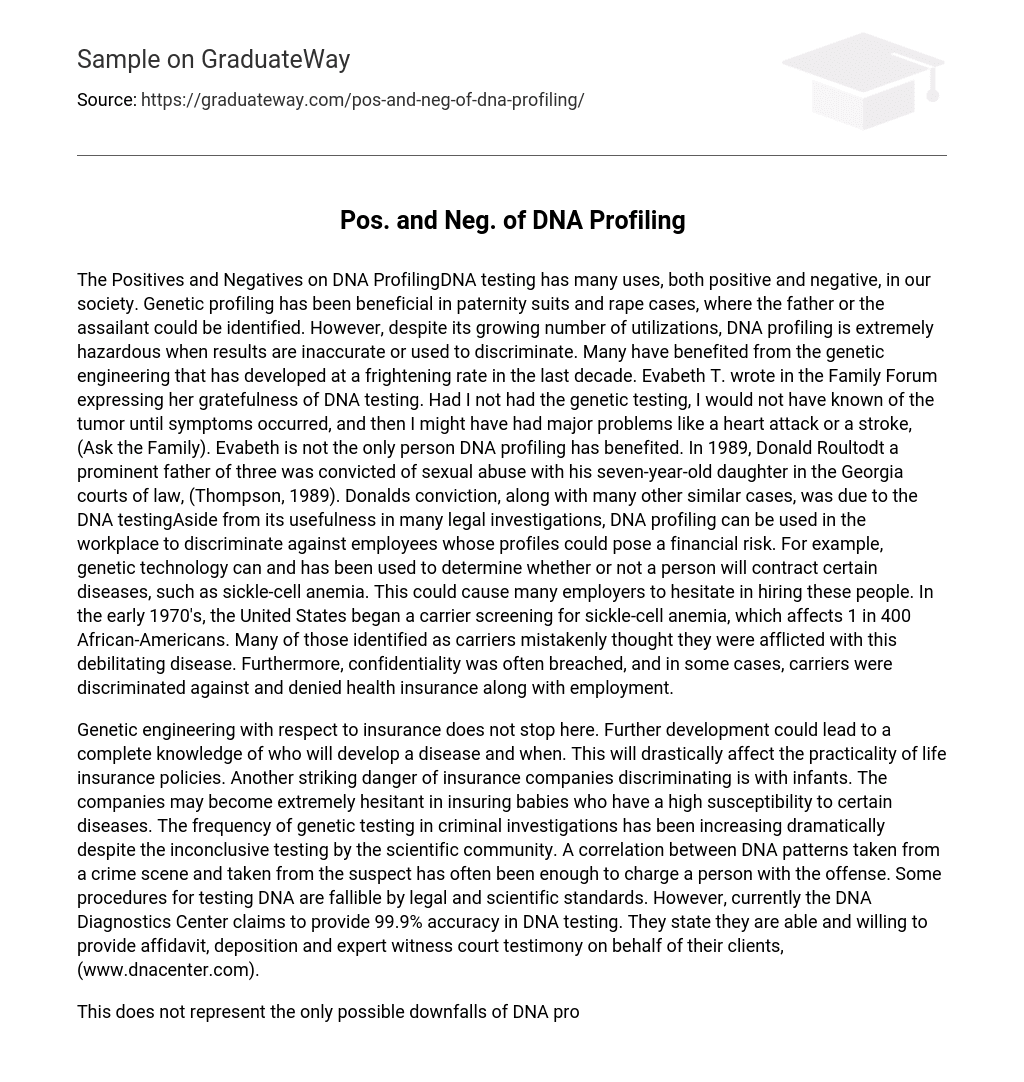The Positives and Negatives on DNA ProfilingDNA testing has many uses, both positive and negative, in our society. Genetic profiling has been beneficial in paternity suits and rape cases, where the father or the assailant could be identified. However, despite its growing number of utilizations, DNA profiling is extremely hazardous when results are inaccurate or used to discriminate. Many have benefited from the genetic engineering that has developed at a frightening rate in the last decade. Evabeth T. wrote in the Family Forum expressing her gratefulness of DNA testing. Had I not had the genetic testing, I would not have known of the tumor until symptoms occurred, and then I might have had major problems like a heart attack or a stroke, (Ask the Family). Evabeth is not the only person DNA profiling has benefited. In 1989, Donald Roultodt a prominent father of three was convicted of sexual abuse with his seven-year-old daughter in the Georgia courts of law, (Thompson, 1989). Donalds conviction, along with many other similar cases, was due to the DNA testingAside from its usefulness in many legal investigations, DNA profiling can be used in the workplace to discriminate against employees whose profiles could pose a financial risk. For example, genetic technology can and has been used to determine whether or not a person will contract certain diseases, such as sickle-cell anemia. This could cause many employers to hesitate in hiring these people. In the early 1970’s, the United States began a carrier screening for sickle-cell anemia, which affects 1 in 400 African-Americans. Many of those identified as carriers mistakenly thought they were afflicted with this debilitating disease. Furthermore, confidentiality was often breached, and in some cases, carriers were discriminated against and denied health insurance along with employment.
Genetic engineering with respect to insurance does not stop here. Further development could lead to a complete knowledge of who will develop a disease and when. This will drastically affect the practicality of life insurance policies. Another striking danger of insurance companies discriminating is with infants. The companies may become extremely hesitant in insuring babies who have a high susceptibility to certain diseases. The frequency of genetic testing in criminal investigations has been increasing dramatically despite the inconclusive testing by the scientific community. A correlation between DNA patterns taken from a crime scene and taken from the suspect has often been enough to charge a person with the offense. Some procedures for testing DNA are fallible by legal and scientific standards. However, currently the DNA Diagnostics Center claims to provide 99.9% accuracy in DNA testing. They state they are able and willing to provide affidavit, deposition and expert witness court testimony on behalf of their clients, (www.dnacenter.com).
This does not represent the only possible downfalls of DNA profiling in criminology. The involuntary seizure of one’s blood or hair undermines the constitutional rights guaranteed to all citizens by the Fourth Amendment (protection from unreasonable searches and seizures). Nevertheless, many argue that a DNA sample taken from a suspect could lead to an indictment or release of the individual. This would inevitably make an exception to the Fourth Amendment. There is also a current effort to create a national database of DNA, much like the existing database of fingerprints. The use of numerical codes will allow huge databases to search for a match of an individual DNA band. However, these matches are not 100 percent. Many people have argued that the use of a national DNA database infringes on the individuals constitutional rights to privacy. However, law officials have claimed that the advantages with this database supercede the individual’s rights. Society must weigh the advantages of having a past, present, or future criminal’s DNA profile on database with the disadvantages of having one’s own. This could present another problem when private institutions gain access to this database and information is used for discriminatory purposes. For instance, if a private institution, such as a bank, an employer, or an insurance company, receives access to this information, it could influence decisions on loans, hiring practices, insurance rates, etc. Society, then, is faced with a conflict between an individual’s right to privacy and the employer’s or insurance company’s interest in knowing about a person’s health problems. Employers have a number of justifications for genetic testing in the workplace. In some cases, there may be an argument in favor of testing for public health reasons. Judges and juries in the United States have predicted these justifications and have began to make the necessary rulings. The judicial opinions said that there would have to be harm done to others from having the individual employed. Hopefully, rulings such as these will serve their purpose in protecting the right of all citizens, (Privacy and DNA Fingerprinting News, 1994). In Blood Testing, AIDS, and DNA Profiling: Law and Policy, Andrew Grubb makes the following statement. With individuals concerned about confidentiality and discrimination, and insurers and employers concerned about liability, it will fall upon legislators and the courts to define the proper use of genetic information. What matters is how the knowledge of DNA profiling is used. DNA profiling can be an extremely beneficial tool in the war against crime. However, when used for discriminatory purposes, this tool becomes a crime in itself. The ability to compare and contrast a person’s genetic code with another should not be taken lightly, for with this great knowledge comes great responsibility. BibliographyAsk the Family. VHL Family Alliance Home Page 5:4 (December 1997): Online. http://www.vhl.org/newsletter/vhl1997/97dpdnat.htm.
Grubb, Andrew. Blood Testing, AIDS, and DNA profiling: Law and Policy. Bristol: Family Law, 1990. Paternity and Testing Center. DNA Diagnostics Center Home Page Online. 09 October 2000http://www.dnacenter.com/htm. Privacy and DNA Fingerprinting News. Eubios Ethics Institute Publications. Online. 10 October 2000. http://www.zobell.biol.tsukuba.ac.jpmacer/NBBFP.htm.
Thompson, William C. “DNA Evidence in Criminal Law: New Developments.” Trial. 08 August1989. Words/ Pages : 1,064 / 24





